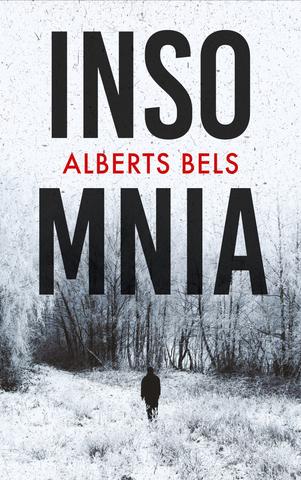Glen James Brown reviews the English translation of a seminal controversial work on Soviet Russia, Insomnia by Alberts Bels.

Written in 1967, but banned as an anti-Soviet work, Insomnia by Albert Bels didn’t see the light of day until 2003. It is a slim, fragmentary novel that adds up to way more than the sum of its parts.
Edgars Dārziņš is suffering through another night of sleeplessness when a beautiful, unnamed woman crashes into his solitude and takes refuge in his room. She is on the run—from who and what we don’t yet know—and promptly passes out in his bed; a moment later the entire building was jarred by a chilling scream. The initial setup of Insomnia is pure hardboiled noir, but where the fiction of, say, Chandler or Ellroy relies on subterfuge and action, Bel’s world is one of claustrophobia and paralysis. It’s the first of the novel’s many left-turns.
Alberts Bels ensured that you understood that Edgars is not your typical pro-active protagonist of Soviet Realist literature. He is a man of resignation, with no family, precious few social signifiers, and his work—that holy lynchpin of Soviet ideology—is a futile, deadening horror. He wants to let life pass over him like clear, flowing water, but this is easier said than done. His apartment block is groaning at the seams with people, the walls are paper-thin and everyone has their nose in each other’s business. Escape is not an option, in either private life or the surveillance state of the Latvian Soviet Socialist Republic at large. Accordingly, Bels’ characters take the only remaining form of liberation left—they turn inwards into memory, stream of consciousness, and, most intriguingly of all, the pagan forests of the 13th century.
Insomnia is a novel of fragments. We understand Edgars’ through his memories as he watches the sleeping woman—his childhood on a collective farm, his tepid relationship with Ulrika, seemingly the only person in his life—but everything is disjointed, haunted by reoccurring imagery: snow blizzards, forests, butchered horses, his German ‘uncle’ Hans, rotting in a field after the Nazi retreat during World War 2. Events cycle back more than once, each time from a new and disturbing angle.
But personal history is not the only one being explored in Insomnia by Edgars Bels. As the night wears on, a parallel narrative set in Medieval Latvia weaves in and out of Edgars’ recollections. In the 13th century, Rome sends the Order Of The Brothers Of The Sword—an organization of crusading Christian knights—to rid Latvia of its pagan beliefs, by force if necessary. At its head is the brutal ‘Master’, who tasks Baliff Dārziņš, a native Latvian—and who so happens to share Edgars’ surname—with quelling native unrest by bricking up beautiful pagan girl Ulrika—also coincidently names after his on-again-off-again 1960s girlfriend—in the walls of a newly built church. But Dārziņš is in love with Ulrika, and must make a decision: sell his soul to the invaders, or die fighting for the woman and country he loves?
The parallels with Soviet rule are obvious enough, but what makes Insomnia interesting is its refusal of didacticism. This is most powerfully explored towards the end of the book when the narrative morphs into series of splintered monologues. We enter the heads of the apartment’s residents—overworked housewives, bitter students, lonely elders and even characters from the 13th Century narrative—as they wrestle with their own demons. They are pure Modernist stream-of-consciousness, ranging from the reasonably coherent, to the nonsensical (Ksh, ksh, ksh, ksh, whish, whish, whish…), to the absolutely terrifying:
TILL THE END OF YOUR LIFE, THE MURDERER SAID, AND TWO MASKED MEN WITH FIRM FINGERS HELD MY ARMS AND LEGS. AND THE MURDERER CAME UP TO ME, RIPPED MY SHIRT APART, WITH A BONY FINGERNAIL SCRATCHED A MARK ON MY HEART, SLOWLY PIERECED ME WITH THE BLADE OF A KNIFE BETWEEN MY RIBS, HE TORE OFF MY SKIIN, MUSCLES, TOUCHED MY HEART.
AAAAAH.
In this edition, Parthian have included a fascinating document by the Soviet ‘Literary-Scientific Expert Commission’, on their reasons for banning Insomnia back in 1967. They state that the novel is saturated with an open and insolent tone from beginning to end, citing multiple instances of Bels’ Anti-Soviet attacks. Focus is on Edgars’ criticism of the ideological and material reality of Soviet Latvia—the poor living conditions, the craven desire for material products, the mind-numbing adherence to Soviet ideology—but you feel that for the author, the failure of the Communist state runs much deeper. The fragmentary glimpses of the characters’ internal worlds reveal communal existence to be a thin veneer—we are fundamentally and inextricably lost in our own internal landscapes, forever alone and unknowable. Tumbling together 20th and 13th Century voices lend the book a mystical slant, suggesting even something as eternal-seeming as Soviet rule is just another spoke on an endlessly turning wheel.
That Albert Bels’ manages to fit all of this into 160 pages is remarkable. There are no easy answers, no demonstrable moral. Whether this was by design to escape the Soviet censors or a simple comment on the mistakes we as a species seem doomed to repeat, is open for discussion. But it is a discussion worth having, and definitely why Insomnia is such a strange and rewarding read.
Insomnia by Alberts Bels is available now from Parthian.
Other work by Glen James Brown is available via the Wales Arts Review website.











